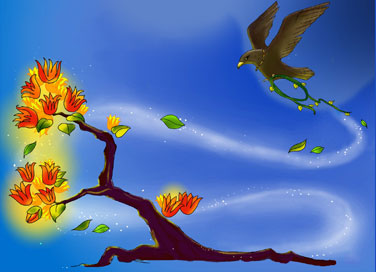The Origin Of The Palasha Tree
- September 7, 2020


The Origin Of The Palasha Tree
- September 7, 2020
The palasha herb is very significant in Ayurveda, with many medicinal properties. In fact, it was considered very auspicious in ancient times, with a palasha twig being a part of the gurudakshina that a potential student would give to their teacher. There’s a very interesting story around its origins.
One day, Indra, the king of the gods, felt very thirsty. The gods of his court asked the goddess Gayatri to go to the celestial mountain Mujavana, where the Soma creeper grew. She was told to bring this back for Indra, so he could have an uninterrupted supply of Soma.
Gayatri took the form of an eagle and flew to the mountain. The mountain was fiercely guarded by the sentries of the Moon. She swooped down and seized the creeper in her beak before the startled sentries could do anything. With her prize secure, she flew away, screeching triumphantly.
To receive more such stories in your Inbox & WhatsApp, Please share your Email and Mobile number.
However, one of the sentries, Krishanu, did manage to let fly an arrow at the bird. The arrow missed Gayatri but struck the vine in her beak, causing one of the leaves to fall off. This leaf fell to the earth and grew into the Palasha tree.
To receive more such stories in your Inbox & WhatsApp, Please share your Email and Mobile number.

Comic of The Month
The Naval Journey of India Book I
This book is the first of a three-book series that takes a deep and detailed look at India's Naval History and a deep insight into the lives of our men and women in white. But any series on the Indian Navy has to start at the very beginning - exploring India's celebrated maritime history. Join our little hero, Bharat, and his grandfather, Commodore Sagar, as they sail into the deep blue waters of time. Book I of The Naval Journey of India takes a sweeping look at India's maritime endeavours, how the seas impacted us over millennia and how the oceans made us who we are.